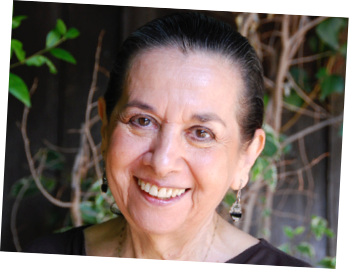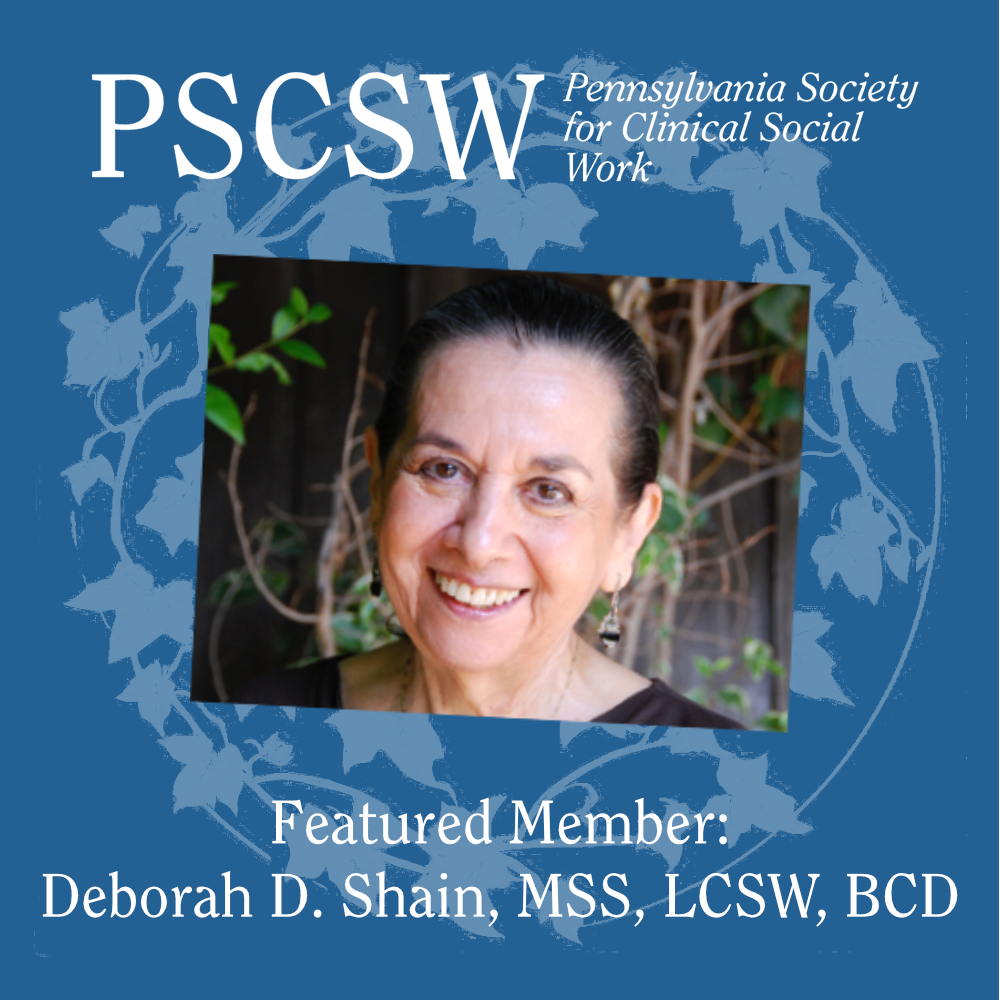As PSCSW moves forward, we are proud to introduce our Featured Members series on The Clinical Voice blog. These spotlights will celebrate the dedicated individuals who have shaped and continue to enrich our organization. We begin with Deborah D. Shain, MSS, LCSW, BCD, a long-term member whose journey exemplifies passion, resilience, and the profound impact of community. The following article is taken from Deborah’s own writing about her history and experiences with PSCSW.
Deborah’s Path to Clinical Social Work
 Who am I, and why do I care about PSCSW? Back in 1973 as a student at Bryn Mawr, though I never heard of “social location”, I was aware that my life was shaped by my history, my culture, and my physical gifts and limitations. I was a post-polio survivor, a middle-aged Jewish woman, a single Mom of three challenging adolescents, guided by my “I am my brother’s keeper” values, my social justice activities, my curiosity, and motivated by my constant search for life’s meaning.
Who am I, and why do I care about PSCSW? Back in 1973 as a student at Bryn Mawr, though I never heard of “social location”, I was aware that my life was shaped by my history, my culture, and my physical gifts and limitations. I was a post-polio survivor, a middle-aged Jewish woman, a single Mom of three challenging adolescents, guided by my “I am my brother’s keeper” values, my social justice activities, my curiosity, and motivated by my constant search for life’s meaning.
As a clinical social worker, I befriended. myself as an evolving professional with a confusing plethora of opportunities. The wisdom and direction gleaned from my psychoanalysis taught me that life— with its joys and struggles— offered me choices. I could decide whether or not to submit to internal and external forces that might rob me of my very SELF— or conversely to discover and use the strength of my inner capacity and freedom to think, to feel, to create, to relate, and to care.
Would I shrivel like a withered leaf blown about by life’s pain? Or will I thrive like the willow tree that bends with the wind and remains rooted in the gifts that Earth provides? My search for meaning led me to the inevitable path of becoming a social worker determined to use my life to empower others to know, grow, honor and appreciate themselves.
But I was lonely, ambitious, and eager to find like-minded souls to support the meaning in my life and the lives of my clients. PSCSW offered me —as a neophyte social worker— the gifts of a safe-space offered by generous professionals. The seasoned colleagues I befriended helped: Pat Burland, Ruth Cohen, Anita Lichtenstein, Joan Sadoff, Mary Montague, Alma Orchnick, Marta Zehner, Robbie Eisenberg, and Judy Kasser (our first president). We met at Jewish Family Service with the purpose of providing educational opportunities for members of the newly-forming organization, PSCSW — to hone skills and support one another as professional psychotherapists and social activists. PSCSW members posed healthy and challenging questions. They constructed an intellectual oasis in which to examine our counter-transference insights, our mandates for personal and professional growth, anti-burn-out techniques, and meaningful personal and professional relationships fed by tears, laughter, and the whole gamut of emotions engendered by our work as Clinical Social Workers.
::Deborah’s personal journey of resilience and self-discovery naturally led her to seek out a community where she could both contribute and grow—an endeavor that found its home in the early days of PSCSW::
Building PSCSW: The Early Years
I found I was lonely, ambitious, and eager to find like-minded souls to support the meaning in my life and the lives of my clients. PSCSW offered me —as a neophyte social worker— the gifts of a safe-space offered by generous professionals. The seasoned colleagues I befriended helped: Pat Burland, Ruth Cohen, Anita Lichtenstein, Joan Sadoff, Mary Montague, Alma Orchnick, Marta Zehner, Robbie Eisenberg, and Judy Kasser (our first president). We met at Jewish Family Service with the purpose of providing educational opportunities for members of the newly-forming organization, PSCSW — to hone skills and support one another as professional psychotherapists and social activists. PSCSW members posed healthy and challenging questions. They constructed an intellectual oasis in which to examine our counter-transference insights, our mandates for personal and professional growth, anti-burn-out techniques, and meaningful personal and professional relationships fed by tears, laughter, and the whole gamut of emotions engendered by our work as Clinical Social Workers.
But back in 1973 there were no State mandated licensing for social workers, nor did we have legal professional standards guiding us in the privilege and responsibility of working with clients. The legislative thrust of the early PSCSW member demanded that the State protect clients and insure professional behavior by setting licensing standards for our profession. And I was happy to be on board for that grueling work. Joining with my PSCSW colleagues gave me the zest to put into action my continued quest for MEANING and to explore my ultimate purpose to life.
My love of new ideas and application of theories and yearning for like-mined people gave me reasons to become active in PSCSW. Pat Burland introduced me to Dr Margaret Mahler’s Developmental Point of View: i.e. the formation of a baby’s personality is founded on the quality of the relationship with its mothering person. As a result, I attended every Mahler Symposium, became active in a Mahler study group. Mahler’s research has been the lens through which I continue to view my work with clients and my personal relationships. (Yes, even in the current political turmoil I hear Mahler’s voice!)
::The supportive environment and meaningful connections Deborah found within PSCSW became the catalyst for her deep involvement in advocacy and education—key areas where she would leave a lasting mark.::
Advocacy, Education, and Growth
The 1975 PSCSW in-house workshops awakened my thirst for more understanding of my clients’ relational skills, opportunities, and limitations. Weekly workshops explored such issues as Kohut and Kernberg’s insights and treatment of narcissism and borderline personality disorders and their application to our clients’ challenges. We also met in each other’s homes for monthly case studies and critiqued and supported each others’ work.
While snacking on our pot-luck offerings, we discussed the effects of hunger and fear on pre-frontal cortex functioning. And we examined cultural determinants of physical and mental health. All realities were grist for the mill!
After months of lobbying, trips to Harrisburg, and exhausting efforts . . . together we achieved our goal of Licensing and Standards for Clinical Social Work practice. Now we were legally established as recognized professionals—- not just “do-gooder” folks who wanted to do compassionate work for our clients.
Achieving the Licensing privilege and responsibility meant that my full-time private practice felt more ethically-bound, more structured and more legitimate. All of this new-found professional identity happened about the same time I was asked to teach the second year Clinical Seminar at Bryn Mawr. I continued my private practice and at the same the teaching aspect of my professional career grew and flourished. (And it still does).
As a result of presenting Family Life Education lectures to community organizations, I was recruited to provide counseling service for medical students of Medical College of Pennsylvania (MCP) who were unsuccessfully juggling the heavy load of studies with the responsibilities of their personal lives. At MCP, along with Dr. Maryellen Hartman — using a Social Work prospective— I helped to create the Health Career Opportunity Program where we provided ancillary and tutorial services for non-traditional and minority students. With the success of that program, I was commissioned by Springer-Verlag to write my book, Study Skills and Test-taking Strategies for Medical Students: Find and Use Your Personal Learning Style. I was also promoted to become the Director of the Programs For Academic Support Service (PASS). In that role, I created and taught the required Sexuality courses and Geriatric courses at the Medical College of PA (now Drexel Medical School). And I recruited PSCSW colleagues to facilitate the small group discussions for these courses. After MCP, I taught the Crisis Intervention courses and the Group Dynamics courses at Cabrini College. At Cabrini my work was enhanced and my personal life enriched by meeting and getting to know fellow Social Work faculty members and fellow members of PSCSW— Valerie Daniel and Gary Jones. Their personals prospectives of social work values and ethics remains a guiding star in my practice.
::Through her advocacy and educational contributions, Deborah helped shape the professional standards and collaborative spirit that define PSCSW today—a legacy that continues to influence the next generation of clinical social workers.::
PSCSW’s Enduring Impact
During Ginny MacIntosh’s presidency, Pat Burland asked me to take over her responsibilities offering free ethics consults for PSCSW members, Unsure that I knew enough, I demurred, but with coaxing I whispered a hesitant “yes”. I worked in tandem with Pat and Ellie Bulova as I eased into this most interesting and challenging “give-back” of my PSCSW affiliation.
The early learning experiences of small groups offered by PSCSW was the nascent inspiration for me to leap at the opportunity to join in David Wohlsifer’s efforts to appeal to then-president, Joan Pollak, to sponsor the birth of what is now the PSCSW “Book Club” aka The Clinical Book Discussion Program. At the same time that we were organizing Book Club, David orchestrated a marketing symposium for the PSCSW Private Practice Committee. And because he was the “Pied Piper” of Social Work, I signed up enthusiastically! It was by working together with David Wohlsifer, Cindy Shapiro, Liz Betterly, Claudia Apfelbaum, that I found not just colleagues, but warm friends.
So, if you haven’t guessed by now by participating in the mission of PSCSW, and because I invest my energy with you—my innovative, creative, generous, friends and colleagues of PSCSW— I am living Viktor Frankl’s central idea. “That the primary human drive is to find meaning in life.” In these turbulent times, neither we nor our clients can escape suffering, but we can choose how to cope with it so that we find meaning in it. Take it from this very grateful 92 year old still-working LCSW, the more involved you become with PSCSW, the more you will thrive. Because, by getting fully invested in something of value and purpose, you can almost guarantee that you will welcome inner peace and find meaning in your life.
“”Looking back on her experiences, Deborah’s story illustrates how PSCSW is more than just an organization; it is a vibrant community where meaningful involvement fosters both personal fulfillment and professional growth.::
Connect with Deborah:

Deborah D. Shain, MSS, LCSW, BCD
Professional Standards: Ethics & Licensing Committee Chair; PSCSW
Location:
Elkins Park, PA
Contact:
215-782-8666
Linkedin profile

